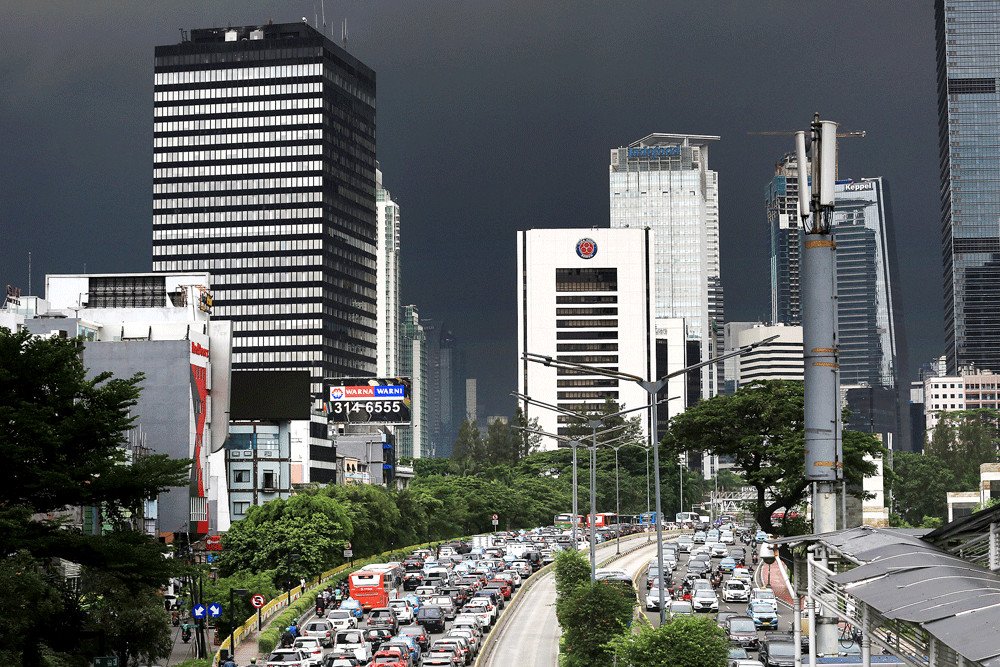Popular Reads
Top Results
Can't find what you're looking for?
View all search resultsPopular Reads
Top Results
Can't find what you're looking for?
View all search resultsPreparing for very bad floods
Urban legend has it that Jakarta gets very bad floods once every five or six years as the city has had them in 1996, 2002, 2007 and 2013.
Change text size
Gift Premium Articles
to Anyone
 Heavy clouds are seen in the sky above Jakarta. The Meteorology, Climatology and Geophysics Agency (BMKG) is monitoring and analyzing rainfall across Indonesia. It said in its latest report that rain had hit various parts of Java over the last several weeks, causing flooding and landslides. (The Jakarta Post/Dhoni Setiawan)
Heavy clouds are seen in the sky above Jakarta. The Meteorology, Climatology and Geophysics Agency (BMKG) is monitoring and analyzing rainfall across Indonesia. It said in its latest report that rain had hit various parts of Java over the last several weeks, causing flooding and landslides. (The Jakarta Post/Dhoni Setiawan)
J
akartans are bracing for flooding around New Year’s Eve. Urban legend has it that Jakarta gets very bad floods once every five or six years as the city has had them in 1996, 2002, 2007 and 2013. We have not had a very bad flood in 2018 so far, so could it happen early next year?
The Meteorology, Climatology and Geophysics Agency (BMKG) says there is no such thing as a regular cycle of huge floods, although it warned about unexpected weather in response to recent reports of hail in Depok, West Java and wind-damaged buildings in South Jakarta. The BMKG says Greater Jakarta residents should soon expect heavy rains, lightning, thunder and strong winds.
Nevertheless, the Jakarta administration must do its best to prepare for the worst this rainy season. Since Jakarta Governor Anies Baswedan took office in October 2017, he has engaged in a debate with the office of the Public Works and Housing Ministry that is in charge of the Ciliwung and Cisadane rivers.
The office maintains that Jakarta must continue Anies’ predecessor, Basuki “Ahok” Tjahaja Purnama’s, program of river normalization, which involved demolishing poor neighborhoods to make way for concrete sheet piles and inspection roads along the riverbanks.
Anies is instead insisting on taking care of the rivers his own way. “We are deploying all 192 pieces of heavy equipment to dredge and maintain the rivers,” he said, citing “naturalization”. Besides dredging, it includes the “improvement of infrastructure related to rivers and lakes” in Jakarta.
The capital has also begun constructing vertical drains, but they are still limited to only a few areas. Jakarta’s floods result from decades of rapid, unsustainable development over previous green water-retaining areas. The city is now less than 10 percent green space and many residents violate the building codes that regulate structures that cover only 60 percent of the available property.
In the International Planning Studies journal in 2015, Deden Rukmana wrote that from 1985 to 2005, Jakarta had undergone five big spatial planning conversions, with water catchment areas, protected forest areas, green areas and urban forests converted into middle- and upper-income housing and commercial buildings like malls. This covers almost 4,000 hectares of land in Kapuk, Sunter and Kelapa Gading in the north, Tomang in the west and Senayan in the south.
The capital’s loss of much of its land’s water retention ability, plus rapid development around the upper reaches of its 13 rivers and land subsidence, have made a flood-free Jakarta nearly impossible. Even as Ahok demolished thousands of riverbank houses for “normalization”, upscale Kemang in South Jakarta saw flood waters inundate cars and houses to a depth of around 50 centimeters.
Even a US$150 million loan from the World Bank to dredge Jakarta’s rivers would not end the floods. If the project goes as expected, the bank said, it would only make Jakarta’s huge floods change from a five-year cycle to a 25-year one.
Nevertheless, the city must prepare for the worst, while seeking progress and development that does not sacrifice sustainability for future generations.








